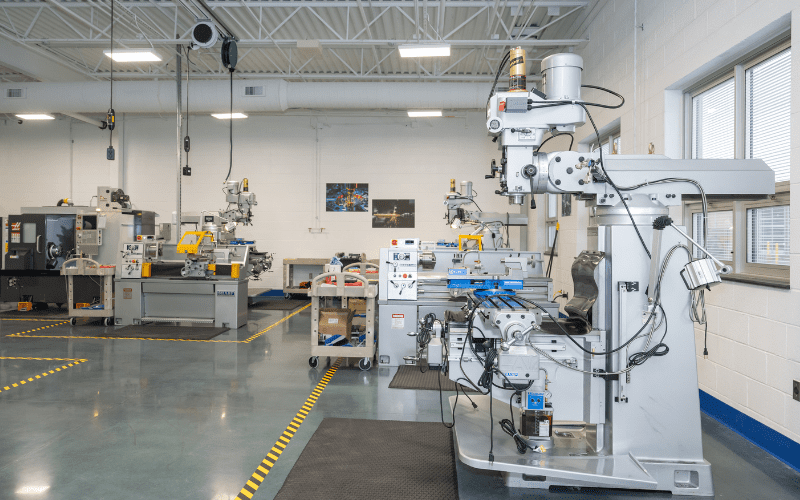
The Gloucester Township Campus of Camden County Technical Schools launched a new Manufacturing Engineering Technology program housed in a customized addition where students gain hands-on experience operating the same tools and technologies used in the industry. – Photos courtesy Camden County Technical Schools and Commissioners
New Program Trains Students in Manufacturing Technologies
Hundreds of thousands of manufacturing jobs exist in New Jersey, but according to the New Jersey Manufacturing Extension Program (NJMEP), the average manufacturing employee is 47 years or older. To drive that number down and create a sustainable employee pipeline, young people need to continue entering the field. Camden County Technical Schools (CCTS) recently took a sizeable step – one measuring 19,206-square-feet – to prepare the next generation for modern manufacturing roles.
CCTS completed an addition to its Gloucester Township Campus to house a brand-new Manufacturing and Engineering Technology (MET) Program. The inaugural MET class, which started in September, includes 25 freshmen and one sophomore. Additional classes of about 20 students will be added each year moving forward.
CCTS Superintendent Wanda Pichardo said these students will graduate with the advanced manufacturing and high-tech skills that are in high demand both statewide and locally. Over four years, they will benefit from learning in customized MET Career, Simulation, and Design Theory labs.
CCTS joins a growing list of New Jersey county vocational-technical schools to complete expansion projects funded through state grants and a county match. The Securing Our Children’s Future Bond Act, passed in 2018, made this funding possible to help schools meet increased student and employer demands for career and technical education programming.
“When we began applying for grant funding, we noted more than 13,000 manufacturing jobs right here in Camden County,” said Pichardo. “We also had anecdotal evidence from our employer partners; they expressed interest in hiring students with broad skills needed for modern manufacturing roles, including in welding and robotics, and experience using industry tools, especially CNC Machines and Programmable Logic Controls.”
Pichardo said the need also emerged among CCTS students for a program that resembled the popular pre-engineering program, yet presented the clear option for students to transition from high school right into the workplace.
“We wanted to support those students who enjoy working with computers, machines and other tools to solve problems yet do not necessarily want to go the engineering route,” she added. “This MET Program engages those students and prepares them for either the workforce or college as their next step.”
Karen Gill, director of teaching, learning and assessment at CCTS, said the STEM Department at Camden County College (CCC) provided invaluable insight into the curriculum development for the new MET Program. As a result, the program incorporates OSHA 10 certification and will likely include opportunities for NIMS credentials in students’ third and fourth years of learning. Students also can earn up to three college credits with CCC in the Machine Shop Practices course and potentially more credits as the MET Program grows.

The Manufacturing Engineering Technology program on the Gloucester Township Campus of Camden County Technical Schools started this year with 25 freshmen and one sophomore in the inaugural class.
In addition to academic partners, Gill said industry professionals helped the program take shape and are now eager to serve as guest speakers and provide job shadowing opportunities.
Stephen Tice, director of operations for Lamatek, Inc. Manufacturing, is one of those engaged industry professionals. He said his own professional journey showed him the “incredible potential in the manufacturing sector” and reinforced his passion to promote it to others.
“Training in the latest manufacturing technologies can bring fresh ideas and perspectives, drive innovation and help local businesses remain competitive,” Tice said. “Overall, establishing a MET Program will not only prepare the students for successful careers, but also strengthen the manufacturing workforce and continue the industry’s growth.”
Expanded Space Sparks Culinary Creativity
CCTS also completed a second construction project on its Pennsauken Campus using Bond Act funding. A 20,991-square-foot addition enabled more students to enroll this school year in the Culinary Arts Program.
Culinary Arts is offered on both CCTS campuses, but the size of the Pennsauken Campus kitchen previously precluded instructors from venturing into baking lessons and limited class sizes to 10-12 students.
The new construction adds two culinary labs and a baking area separated from classroom instructional space. The extra square footage meant the school could accept 30 additional students into the program this year, with 15 focused on baking. Each subsequent class will now be larger to fill the new space and help move interested students off the waitlist.
“We’ve always had student demand for these programs, but the industry demand is also there as new restaurants open up and cuisine becomes much more involved,” said Pichardo. “So, again, we are using our Bond Act funding to fill both student and employer demands in a way that is focused on local wants and needs.”
Gill noted how students graduate with ServSafe food handler certification and have the opportunity to earn a Food Manager certification. This helps students jumpstart their careers in the hospitality industry, whether they want to open their own business, manage food services at a school or retirement community or contribute to a dynamic kitchen.
Students on both campuses also benefit from instructors who have industry experience and have gained recognition for their exceptional skills. One instructor, Chef Tim Witcher, competed
and won the televised competition, Chopped. Another, Chef Ed Battaglia, competed and placed sixth on Hell’s Kitchen.
“We have so many wonderful instructors; they are all superstars to us,” added Gill. “Now, we are able to invite more students to train with these chefs and learn how to be competitive themselves when they enter the workforce.”
CTE Expansion Projects Across the State
Read about additional career and technical education expansion projects funded by the Securing Our Children’s Future Bond Act by visiting https://careertechnj.org/.
Also find opportunities to connect with county vocational-technical schools to learn more about programming and opportunities for partnerships.
This article originally appeared Nov. 1, 2024 in ROI-NJ.



